The tobacco epidemic is one of the biggest public health threats the world has ever faced, killing over 8 million people a year globally.
In February 2025, WHO marked the 20th anniversary of its Framework Convention on Tobacco Control (FCTC), providing a legal framework and comprehensive package of tobacco control measures. The WHO FCTC now has 182 Parties covering more than 90% of the world’s population.
In 2007, WHO introduced a practical, cost-effective initiative to scale up implementation to reduce tobacco use called MPOWER. Today, 5.6 billion people are covered by an MPOWER measure which includes: monitor tobacco use and prevention policies; protect people from tobacco use; offer help to quit tobacco use; warn about the dangers of tobacco; enforce bans on tobacco advertising, promotion and sponsorship; and raise taxes on tobacco.
MPOWER has helped to reduce global deaths from tobacco use and created a global partnership on tobacco control focused on supporting the highest burden countries in the world, with WHO recognized as a global leader.
Thanks to commitment and powerful action in countries, and with support from key donors, tobacco use is declining across all WHO regions. Here are some stories from across the WHO regions demonstrating the impact of WHO’s work in this area.
Tobacco free farms in Kenya and Zambia
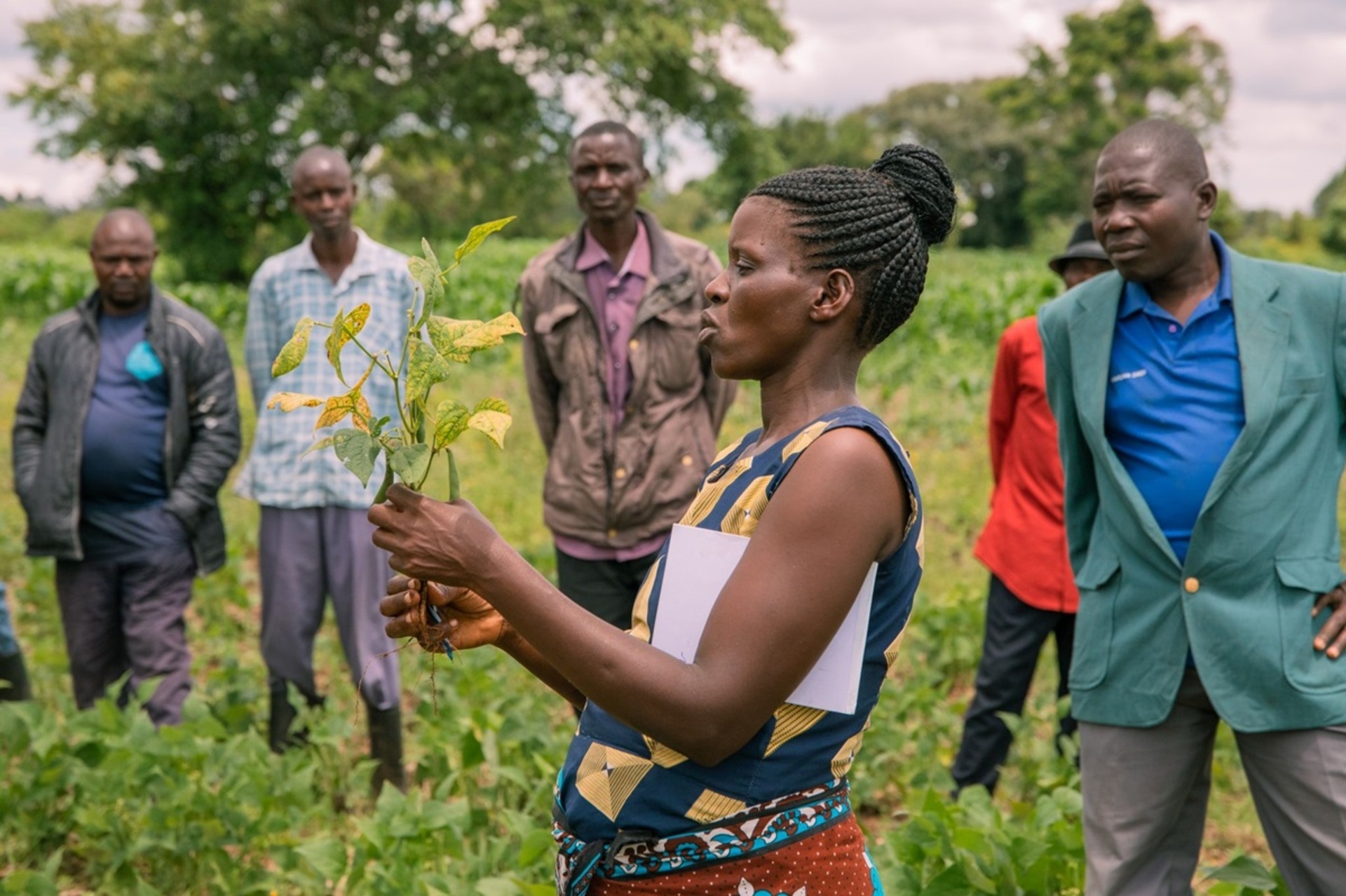 Tobacco free farmer from Migori County, Kenya. Photo by: WHO
Tobacco free farmer from Migori County, Kenya. Photo by: WHO
A record 349 million people are facing acute food insecurity globally. Food insecurity is further exasperated by tobacco production. Tobacco is grown in over 124 countries, taking up 3.2 million hectares of fertile land that could be used to grow food. Tobacco farmers often lack the confidence to shift away from tobacco due to market variability for alternative crops.
WHO, in collaboration with partners, launched the Tobacco-Free Farms initiative in 2021 in Kenya and 2023 in Zambia.
The initiative has supported over 8 600 farmers in Kenya and over 500 farmers in Zambia.
The initiative seeks to move smallholder farmers away from tobacco growth and into nutritious food crops, by creating an ecosystem which could improve household food security and income generation. It may simultaneously add value to farmers’ land through rehabilitation of climate smart and other good agricultural practices.
Read more about the initiative
First ever WHO treaty marks 20 years of saving millions of lives worldwide
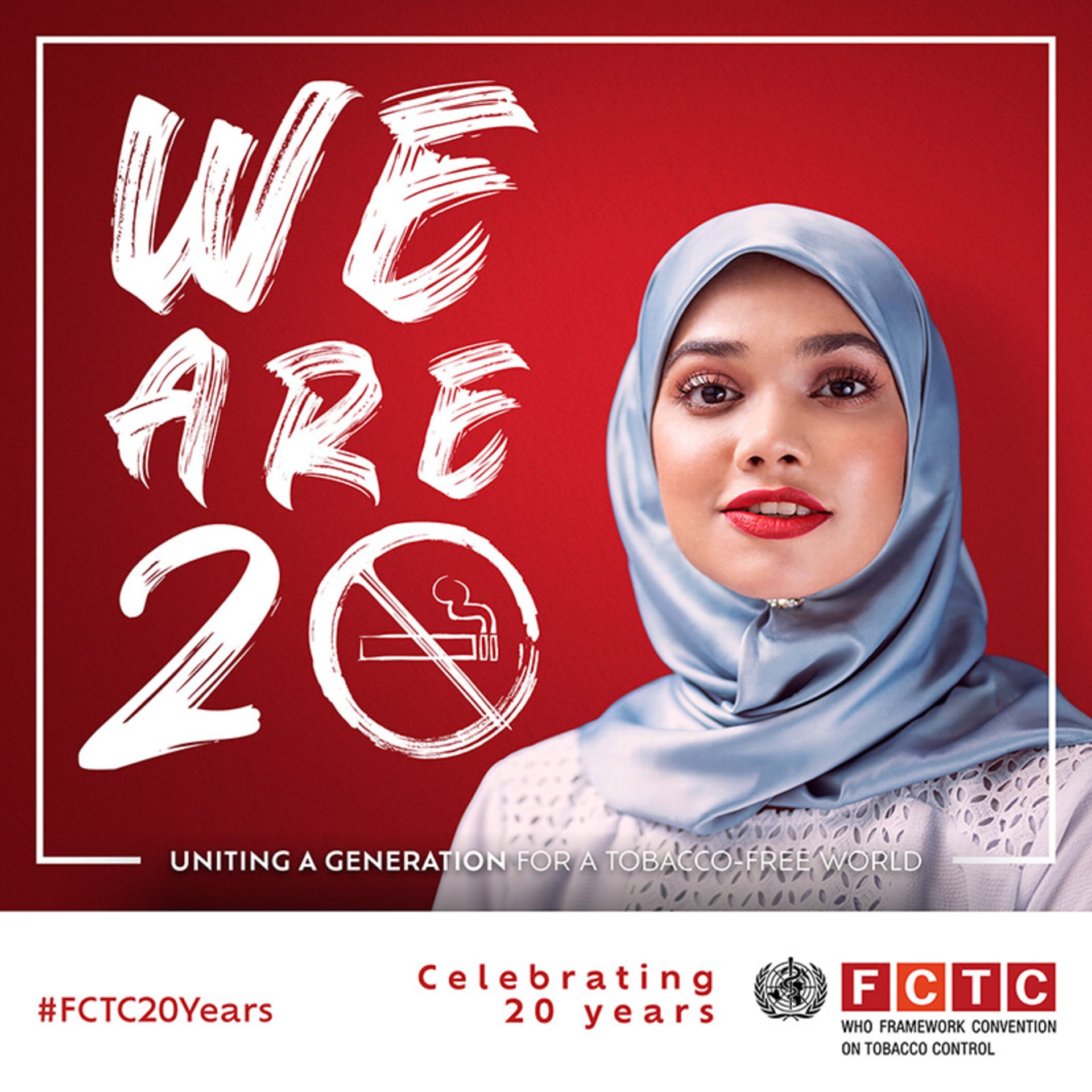
Since the entry into force of the WHO Framework Convention on Tobacco Control (WHO FCTC) and the MPOWER technical package that supports it, global tobacco use prevalence has dropped by one-third. The WHO FCTC has helped to save millions of lives through strengthened tobacco control measures around the world.
Up to 5.6 billion people are now covered by at least one tobacco control policy and studies have shown a decline in global smoking rates. 138 countries require large pictorial health warnings on cigarettes packages because of the Convention and dozens more countries have implemented plain packaging rules on cigarette packages. Both measures serve as powerful tools to reduce tobacco consumption and warn users about the dangers of tobacco use.
Over a quarter of the world's population is now covered by smoke free policies which require bans in indoor and workspaces, saving millions of lives from the dangers of the second-hand smoke.
More than 66 countries have implemented bans on tobacco advertising, promotion and sponsorship which include bans on tobacco advertising in the media and sponsorship deals.
Uganda’s anti-tobacco initiative yields results
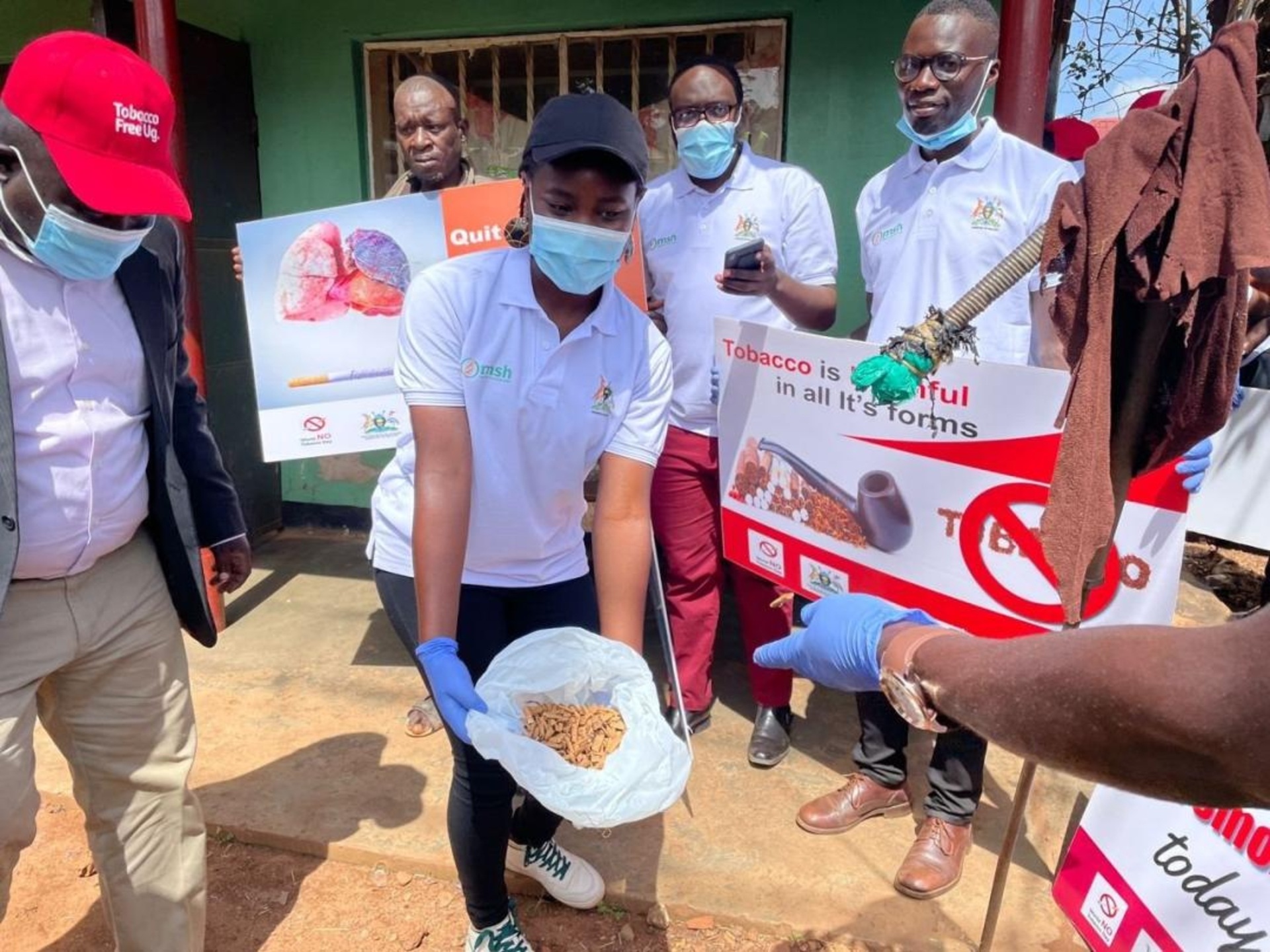 In 2022, WHO trained 157 law enforcement officers and 15 national trainers from five districts in Uganda to raise awareness and help enforce the smoking ban in public places. Photo by: WHO
In 2022, WHO trained 157 law enforcement officers and 15 national trainers from five districts in Uganda to raise awareness and help enforce the smoking ban in public places. Photo by: WHO
In 2007, Uganda signed the WHO Framework Convention on Tobacco Control, a legally binding treaty that requires countries to implement evidence-based measures to reduce tobacco use and exposure to tobacco smoke. In 2015, the country passed its Tobacco Control Act, which regulates tobacco products and their use, including in public places.
These dual interventions have delivered notable results. Between 2014 to 2022, Uganda saw a 51% drop in the prevalence of tobacco use.
WHO played a key role in supporting the Ugandan government’s efforts, building the capacity of tobacco control focal people in government entities since 2015.
Legal measures drive down rates of tobacco use in Mauritania
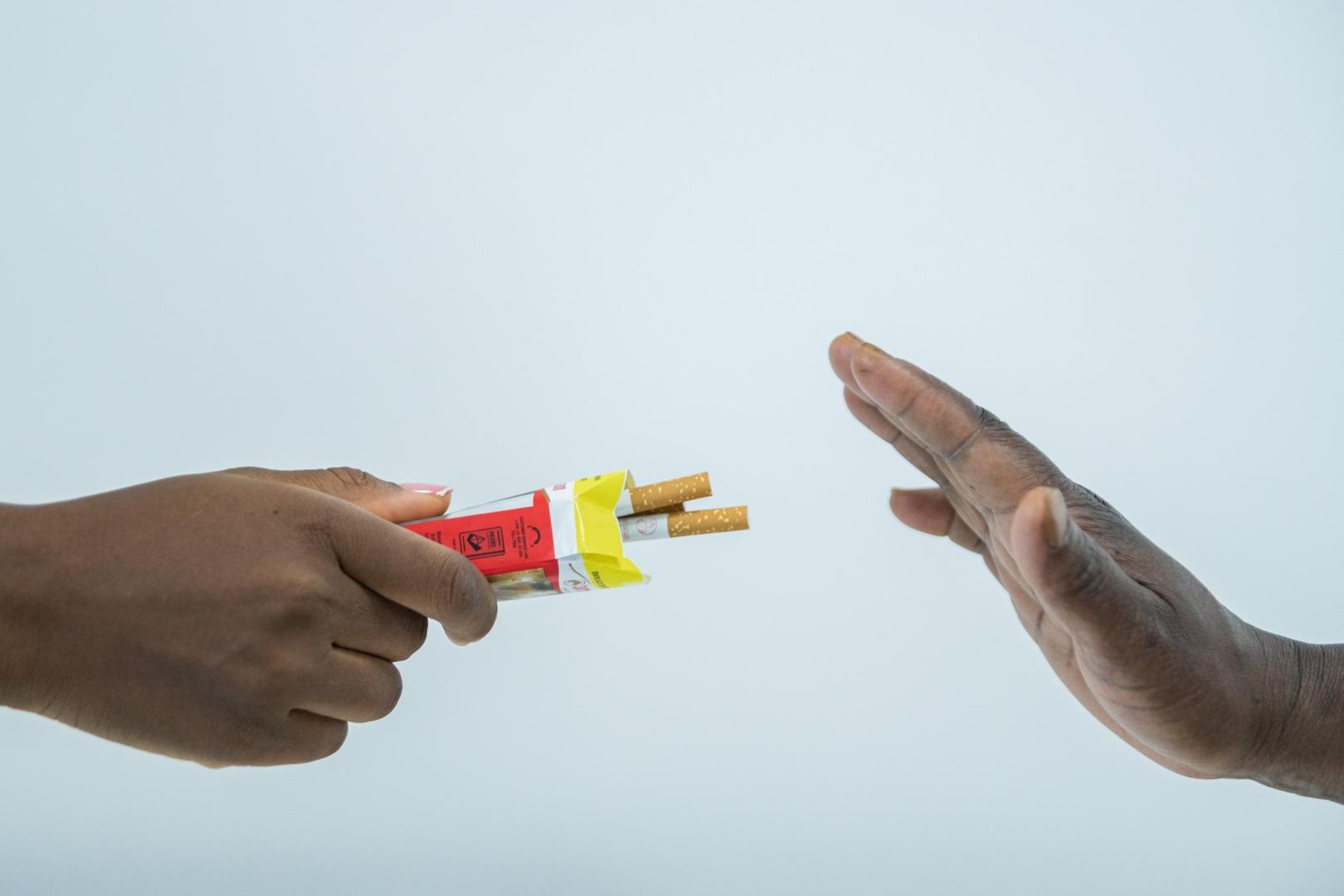 "Quitting smoking is the best decision I've ever made for my health and I'm very proud of it," says Ifrah. "Giving up smoking is difficult, but not impossible. With willpower and determination, it can be done.” Photo by: WHO
"Quitting smoking is the best decision I've ever made for my health and I'm very proud of it," says Ifrah. "Giving up smoking is difficult, but not impossible. With willpower and determination, it can be done.” Photo by: WHO
In 2018, Mauritania introduced legislation in line with WHO recommendations stipulating that all tobacco products on sale in Mauritania must carry a health warning covering at least 70% of the surface area of both sides of the packaging.
These legal steps to introduce graphic health warnings on tobacco packaging are changing the status quo. The 2021 Global Adult Tobacco Survey (GATS) shows that between 2012 and 2021, tobacco use in Mauritania has declined by 8%, from 18% to 10%. Nearly 25% of smokers in Mauritania first noticed health warnings on cigarette packages, while 14% of smokers thought about quitting because of warning labels.
With WHO support, Mauritania’s Health Ministry has provided tobacco control training to 15 regional governors. Mauritania is also implementing awareness campaigns around the dangers of tobacco consumption, a ban on smoking in public places, and the introduction of tobacco taxes.
Pan American Health Organization hosts regional workshop to implement effective tobacco tax policies
Tobacco use remains one of the leading causes of preventable death in Latin America, contributing to high rates of non-communicable diseases. Despite clear evidence that tobacco taxation is one of the most effective public health interventions to reduce consumption, its use is still limited in many Latin American countries.
PAHO/WHO, with partners brought together policymakers from 15 countries to participate in the 3-day workshop, "Advancing Tobacco Taxes in Latin America".
The meeting focused on addressing the ongoing public health and economic challenges posed by tobacco consumption in Latin American countries, emphasizing the potential of tobacco taxes as a cost-effective tool to reduce the burden of tobacco use. Participants included delegates from ministries of health and finance from Argentina, Belize, Bolivia, Brazil, Chile, Colombia, Costa Rica, Ecuador, Guatemala, Mexico, Panama, Paraguay, Peru, Uruguay and Venezuela.
Ministry of Health and WHO release Global Adult Tobacco Survey Indonesia Report
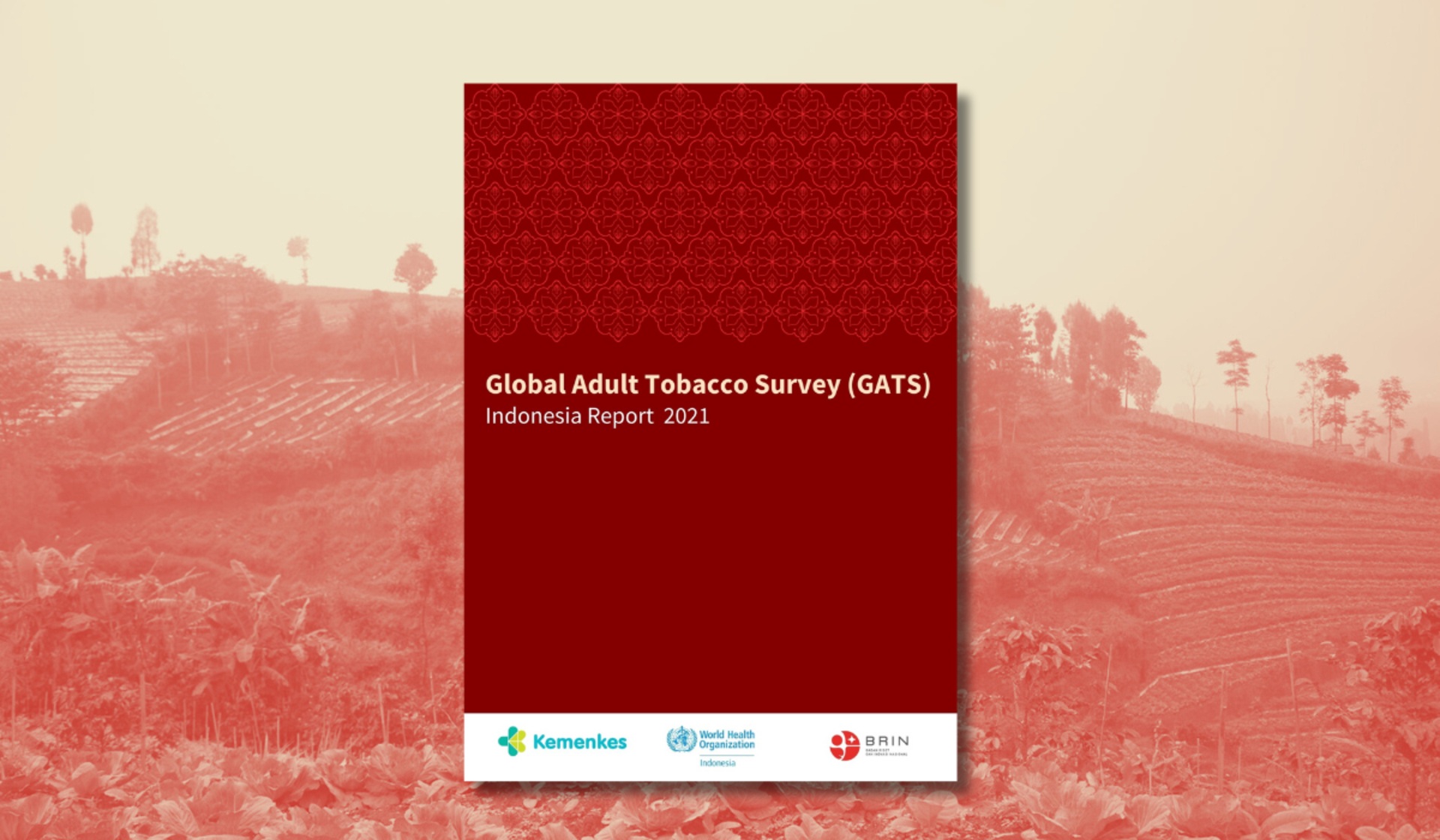
The Global Adult Tobacco Survey (GATS) Indonesia Report 2021 presents detailed information on tobacco use and key tobacco control indicators, using globally standardized protocols and methodologies. The report found that 34.5% of adults – 70.2 million people – used tobacco. Use of electronic cigarettes increased by 10 times in the last 10 years, from 0.3% in 2011 – when the last GATS was conducted – to 3% in 2021.
Across Indonesia, WHO continues to advocate for implementation of strong tobacco control measures. This includes increased taxation of tobacco products, expansion of subnational bans on tobacco advertising, promotion and sponsorship, and stronger, more effective implementation and enforcement of smoke-free policies.
WHO encourages policy makers and public health researchers in Indonesia and globally to access and utilize the GATS Indonesia Report 2021, to better control tobacco and achieve a healthier, more sustainable future for all.
World No Tobacco Day 2024 in Thailand: protecting children from tobacco industry interference
Every year on 31 May, World No Tobacco Day highlights the dangers of tobacco use, exposes harmful business practices of tobacco companies, and empowers individuals to claim their right to health and protect future generations.
In Thailand, a troubling trend is rising among the youth: the growing popularity of e-cigarettes and vaping, driven by aggressive marketing and appealing designs. A sharp rise in e-cigarette use was observed amongst Thai school-aged children (13–15 years), with prevalence increasing from 3.35% in 2015 to 17.6% in 2022, despite the sale of e-cigarettes being banned in Thailand. Children and young people are aggressively targeted through marketing that relies heavily on social media and influencers.
The campaign exposed the tobacco industry's deceptive practices and the real dangers of e-cigarettes, aiming to empower Thai youth to resist the lure of smoking and vaping. WHO urged all stakeholders – readers, parents, educators, policymakers – to unite in this fight, support anti-smoking campaigns, advocate for strict regulations, and educate communities to protect youth and secure a smoke-free future.
Towards a tobacco-free Jordan: launch of national strategy to combat tobacco and smoking
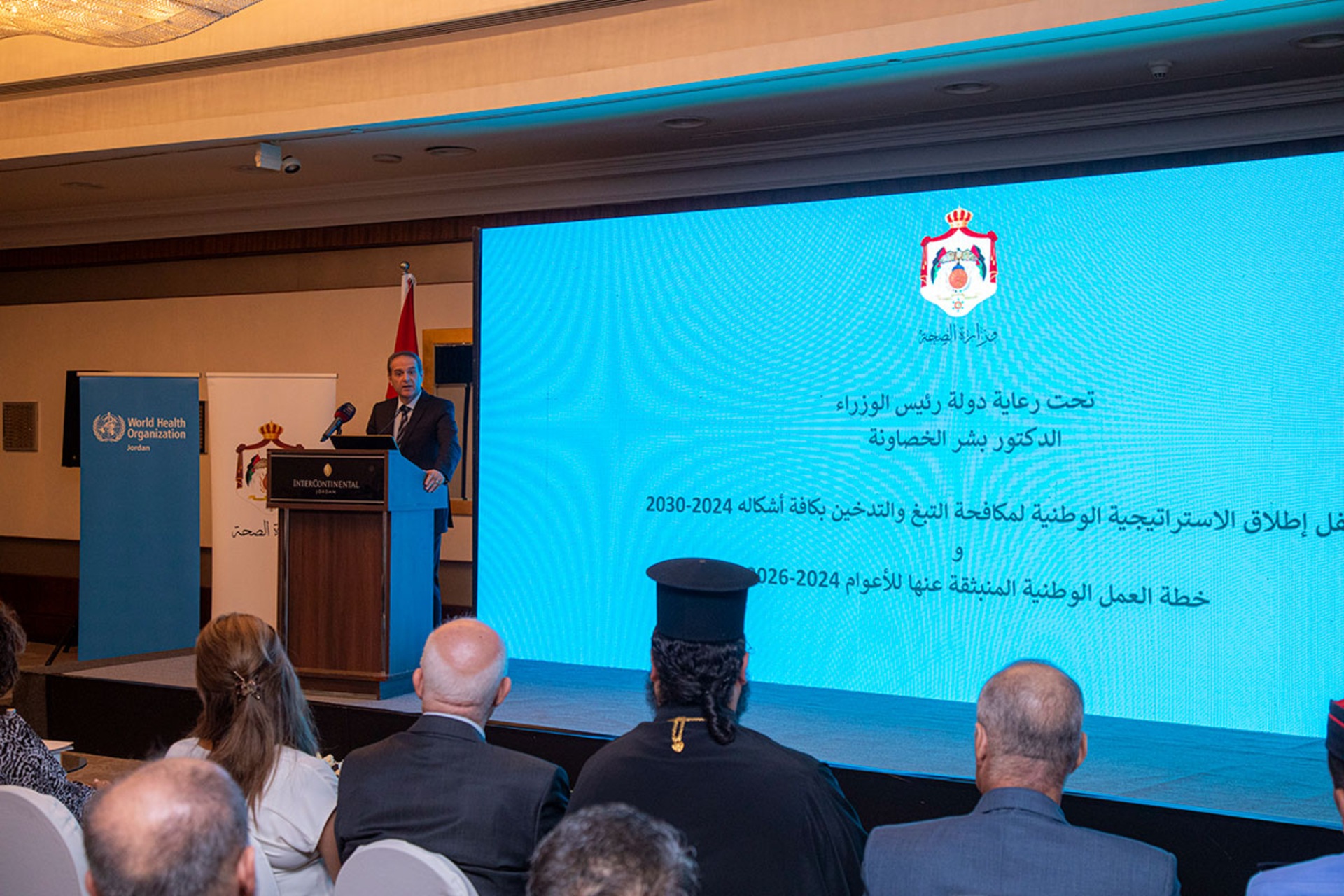
Minister of Health in Jordan delivering speech at the National Strategy to combat tobacco and smoking in all its forms launch. Photo by: WHO
Jordan’s Ministry of Health, with support from WHO, officially launched the National Strategy to Combat Tobacco and Smoking in All Its Forms 2024–2030 and an accompanying action plan for 2024–2026. The landmark launch event was held on 6 June 2024 under the patronage of His Excellency Prime Minister of Jordan Dr Bisher Khasawneh.
A startling 66.1% of males in Jordan are smokers, according to the 2019 Jordan National Stepwise Survey. A further 15.9% of males use electronic cigarettes. According to the WHO global report on trends in prevalence of tobacco use 2000–2030, published in 2023, Jordan is one of just 6 countries globally where tobacco use is still growing.
The Ministry of Health developed the strategy in collaboration with the WHO Country Office in Jordan and incorporated contributions from various ministries, nongovernmental organizations and international experts. This approach has ensured that the strategy is a comprehensive, evidence-based road map tailored to the Jordanian context.
WHO Director-General congratulates the Philippines on its progress in tobacco control, 10 years since the signing of the Sin Tax Reform Law
In January 2023 in Manila, legislators of the Philippine Government, members of the Action for Economic Reforms and the Sin Tax Coalition, and representatives from WHO, development partners and civil society organisations marked the 10th anniversary of the passage of Republic Act 10351 or the Sin Tax Reform Law.
WHO Director-General Dr Tedros Adhanom Ghebreyesus congratulated the Philippines on putting this tax reform and other measures in place for tobacco control. As a result of the many measures taken, tobacco use has dropped from 30% in 2009 to 20% in 2021.
“The taxes are having a clear impact. More smokers are trying to quit because of the high price of cigarettes. The Philippines is a great example for other countries of how raising tobacco taxes can save lives, reduce health costs, and raise revenues”, said Dr Tedros.
